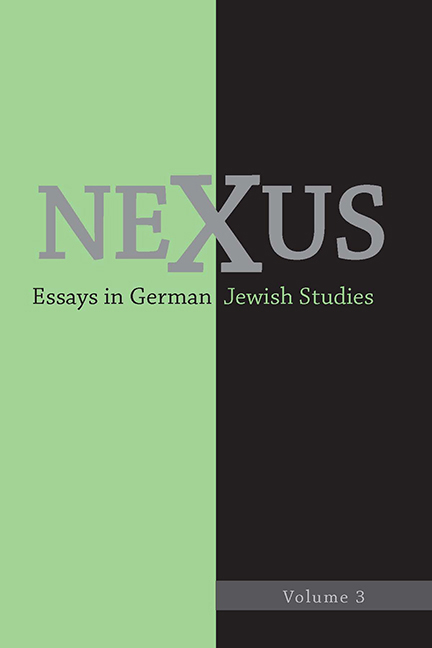Book contents
- Frontmatter
- Dedication
- Contents
- Acknowledgements
- Introduction
- “Ein weites Feld”: Ein Wort zu deutsch-jüdischen Studien anläβlich der Verleihung des ersten Egon Schwarz Prize for the Best Essay in German Jewish Studies
- “An Open Field”: A Word about German Jewish Studies on the Occasion of the Presentation of the first Egon Schwarz Prize for the Best Essay in German Jewish Studies
- Laudatio for Abigail Gillman's Prize-Winning Nexus Essay: “Martin Buber's Message to Postwar Germany”
- Heinrich Heine in Modern German History, by an Eyewitness
- Jeffrey Sammons, Heine, and Me: Some Autobiographical Reflections
- Heine's Disparate Legacies: A Response to Jeffrey Sammons
- My Debt to Heine and Sammons
- Die letzten Tage der Menschheit as a German-Jewish Tragicomedy, and the Challenge to Translators
- Edward Timms's “Die letzten Tage der Menschheit as a German-Jewish Tragicomedy and the Challenge to Translators”: A Response
- Kraus the Mouse? Kafka's Late Reading of Die Fackel and the Vagaries of Literary History
- The Parable of the Rings: Sigmund Freud Reads Lessing
- The Poetics of the Polis: Remarks on the Latency of the Literary in Hannah Arendt's Concept of Public Space
- The Marrano in Modernity: The Case of Karl Gutzkow
- German Jews Dogged by Destiny: Werewolves and Other Were-Canids in the Works of Heinrich Heine and Curt Siodmak
- Authenticity, Distance, and the East German Volksstück: Yiddish in Thomas Christoph Harlan's Ich Selbst und Kein Engel
Die letzten Tage der Menschheit as a German-Jewish Tragicomedy, and the Challenge to Translators
Published online by Cambridge University Press: 11 May 2017
- Frontmatter
- Dedication
- Contents
- Acknowledgements
- Introduction
- “Ein weites Feld”: Ein Wort zu deutsch-jüdischen Studien anläβlich der Verleihung des ersten Egon Schwarz Prize for the Best Essay in German Jewish Studies
- “An Open Field”: A Word about German Jewish Studies on the Occasion of the Presentation of the first Egon Schwarz Prize for the Best Essay in German Jewish Studies
- Laudatio for Abigail Gillman's Prize-Winning Nexus Essay: “Martin Buber's Message to Postwar Germany”
- Heinrich Heine in Modern German History, by an Eyewitness
- Jeffrey Sammons, Heine, and Me: Some Autobiographical Reflections
- Heine's Disparate Legacies: A Response to Jeffrey Sammons
- My Debt to Heine and Sammons
- Die letzten Tage der Menschheit as a German-Jewish Tragicomedy, and the Challenge to Translators
- Edward Timms's “Die letzten Tage der Menschheit as a German-Jewish Tragicomedy and the Challenge to Translators”: A Response
- Kraus the Mouse? Kafka's Late Reading of Die Fackel and the Vagaries of Literary History
- The Parable of the Rings: Sigmund Freud Reads Lessing
- The Poetics of the Polis: Remarks on the Latency of the Literary in Hannah Arendt's Concept of Public Space
- The Marrano in Modernity: The Case of Karl Gutzkow
- German Jews Dogged by Destiny: Werewolves and Other Were-Canids in the Works of Heinrich Heine and Curt Siodmak
- Authenticity, Distance, and the East German Volksstück: Yiddish in Thomas Christoph Harlan's Ich Selbst und Kein Engel
Summary
THE DATE IS JUNE 1914, the setting a street corner in Vienna, and Karl Kraus's documentary drama of the First World War begins with the following exchanges:
ZEITUNGSAUSRUFER: Extraausgabee—! Ermordung des Thronfolgers! Da Täta vahaftet!
KORSOBESUCHER (zu seiner Frau): Gottlob kein Jud.
SEINE FRAU: Komm nach Haus. (Sie zieht ihn weg.)
ZWEITER ZEITUNGSAUSRUFER: Extraausgabee—! Neue Freie Presse! Die Pluttat von Serajevo! Da Täta ein Serbee!
[NEWS VENDOR: Ex-tra-aa edi-shun! Arsh-duke ass-ass-inated! Mur-dra ar-rested!
SECOND NEWS VENDOR: Ex-tra-aa edi-shun!Neue Freie Presse!
Sarajevo blood-bath! Mur-dra a Serb!
PASSER-BY (to his wife): Not a Jew, God be praised.
WIFE: Let's go home! (She pulls him away.)]
This exchange functions as the key to a musical composition, setting up a counterpoint between two of the most significant minorities of the Habsburg Empire—Serbs and Jews. Here, as throughout the play, Kraus shows a dazzling ability to orchestrate the speech patterns of different classes and ethnicities—a formidable challenge to translators.
The overall subject of Kraus's play, as the title indicates, is the tragedy of mankind, bent on self-destruction by the awesome means of modern warfare, while still clinging to outdated ideals of military heroism and national glory. But interwoven within that framework are a multitude of more specific strands, each embedded in its distinctive cultural matrix: bungled Austrian diplomacy, aggressive German expansionism, ruthless military leadership, brutal ethnic cleansing, the greed of war profiteers, the gullibility of newspaper readers, and above all the sloganizing of the press. “Serbien muβ sterbien,” rendered by myself and my co-translator Fred Bridgham as “Serbia—we ’ll murder ’er!,” becomes the battle cry that launches a world war.
Of the 200 scenes in this sprawling play with its disconcerting mix of historically authentic and imaginatively invented characters, only a minority are set in a specifically Jewish milieu. But in Kraus's satirical panorama we encounter a variety of characters whose speech patterns betray traces of Yiddish or similar deviations from standard German. Thus as translators we faced a double challenge. Could we find English equivalents for those “Jewish” speech patterns? And if so, should we make such passages sound specifically Jewish?
In cases where Kraus introduces familiar Yiddish words into the dialogue, such as “nebbich” or “meschugge” the task is relatively easy. A comparable English-Yiddish or American-Yiddish word can be used. But frequently the Jewish speech rhythms have more subtle, socio-linguistic implications.
- Type
- Chapter
- Information
- Nexus 3Essays in German Jewish Studies, pp. 53 - 64Publisher: Boydell & BrewerPrint publication year: 2017



